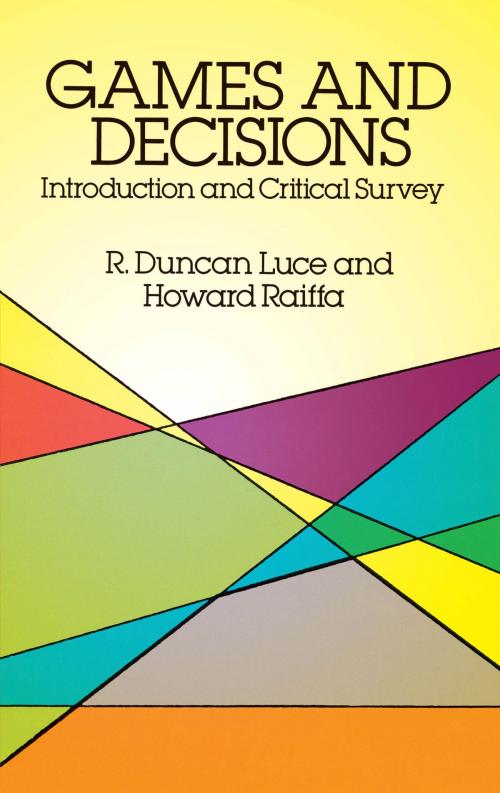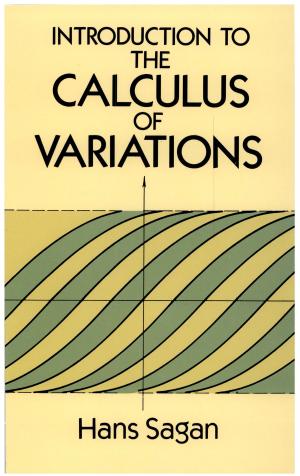Games and Decisions
Introduction and Critical Survey
Nonfiction, Science & Nature, Mathematics, Game Theory| Author: | Howard Raiffa, R. Duncan Luce | ISBN: | 9780486134833 |
| Publisher: | Dover Publications | Publication: | September 20, 2012 |
| Imprint: | Dover Publications | Language: | English |
| Author: | Howard Raiffa, R. Duncan Luce |
| ISBN: | 9780486134833 |
| Publisher: | Dover Publications |
| Publication: | September 20, 2012 |
| Imprint: | Dover Publications |
| Language: | English |
"The best book available for non-mathematicians." — Contemporary Psychology.
This book represents the earliest clear, detailed, precise exposition of the central ideas and results of game theory and related decision-making models — unencumbered by technical mathematical details. It offers a comprehensive, time-tested conceptual introduction, with a social science orientation, to a complex of ideas related to game theory including decision theory, modern utility theory, the theory of statistical decisions, and the theory of social welfare functions.
The first three chapters provide a general introduction to the theory of games including utility theory. Chapter 4 treats two-person, zero-sum games. Chapters 5 and 6 treat two-person, nonzero-sum games and concepts developed in an attempt to meet some of the deficiencies in the von Neumann-Morgenstern theory. Chapters 7–12 treat *n-*person games beginning with the von Neumann-Morgenstern theory and reaching into many newer developments. The last two chapters, 13 and 14, discuss individual and group decision making. Eight helpful appendixes present proofs of the famous minimax theorem, several geometric interpretations of two-person zero-sum games, solution procedures, infinite games, sequential compounding of games, and linear programming.
Thought-provoking and clearly expressed, Games and Decisions: Introduction and Critical Survey is designed for the non-mathematician and requires no advanced mathematical training. It will be welcomed by economists concerned with economic theory, political scientists and sociologists dealing with conflict of interest, experimental psychologists studying decision making, management scientists, philosophers, statisticians, and a wide range of other decision-makers. It will likewise be indispensable for students in courses in the mathematical theory of games and linear programming.
"The best book available for non-mathematicians." — Contemporary Psychology.
This book represents the earliest clear, detailed, precise exposition of the central ideas and results of game theory and related decision-making models — unencumbered by technical mathematical details. It offers a comprehensive, time-tested conceptual introduction, with a social science orientation, to a complex of ideas related to game theory including decision theory, modern utility theory, the theory of statistical decisions, and the theory of social welfare functions.
The first three chapters provide a general introduction to the theory of games including utility theory. Chapter 4 treats two-person, zero-sum games. Chapters 5 and 6 treat two-person, nonzero-sum games and concepts developed in an attempt to meet some of the deficiencies in the von Neumann-Morgenstern theory. Chapters 7–12 treat *n-*person games beginning with the von Neumann-Morgenstern theory and reaching into many newer developments. The last two chapters, 13 and 14, discuss individual and group decision making. Eight helpful appendixes present proofs of the famous minimax theorem, several geometric interpretations of two-person zero-sum games, solution procedures, infinite games, sequential compounding of games, and linear programming.
Thought-provoking and clearly expressed, Games and Decisions: Introduction and Critical Survey is designed for the non-mathematician and requires no advanced mathematical training. It will be welcomed by economists concerned with economic theory, political scientists and sociologists dealing with conflict of interest, experimental psychologists studying decision making, management scientists, philosophers, statisticians, and a wide range of other decision-makers. It will likewise be indispensable for students in courses in the mathematical theory of games and linear programming.















